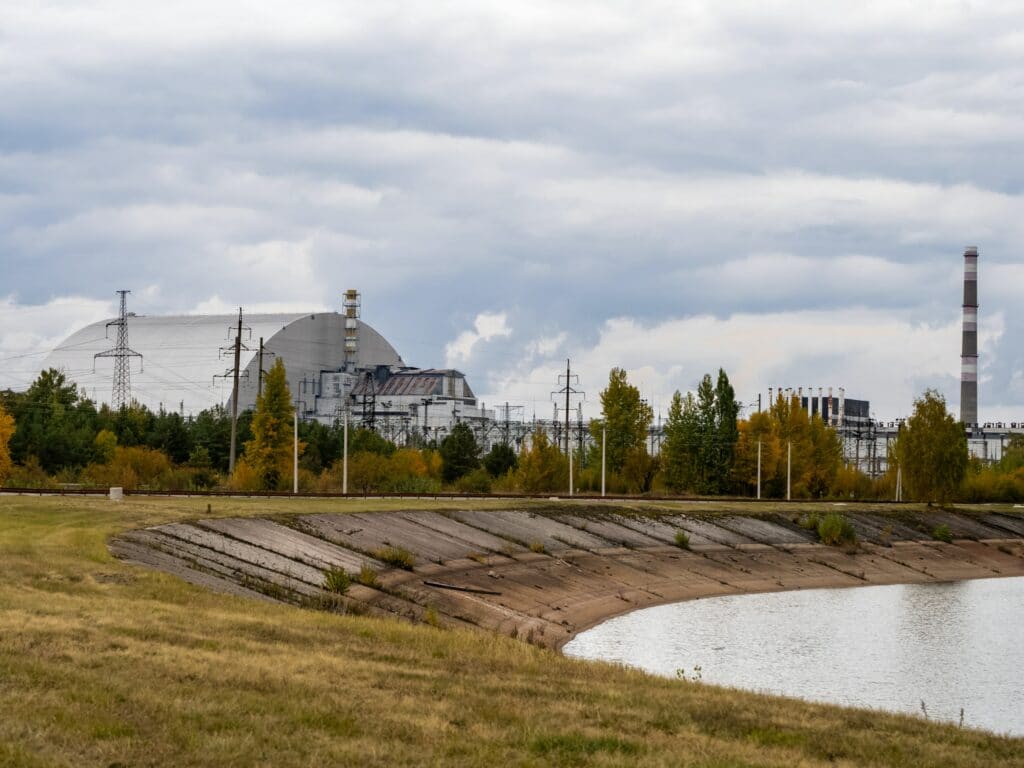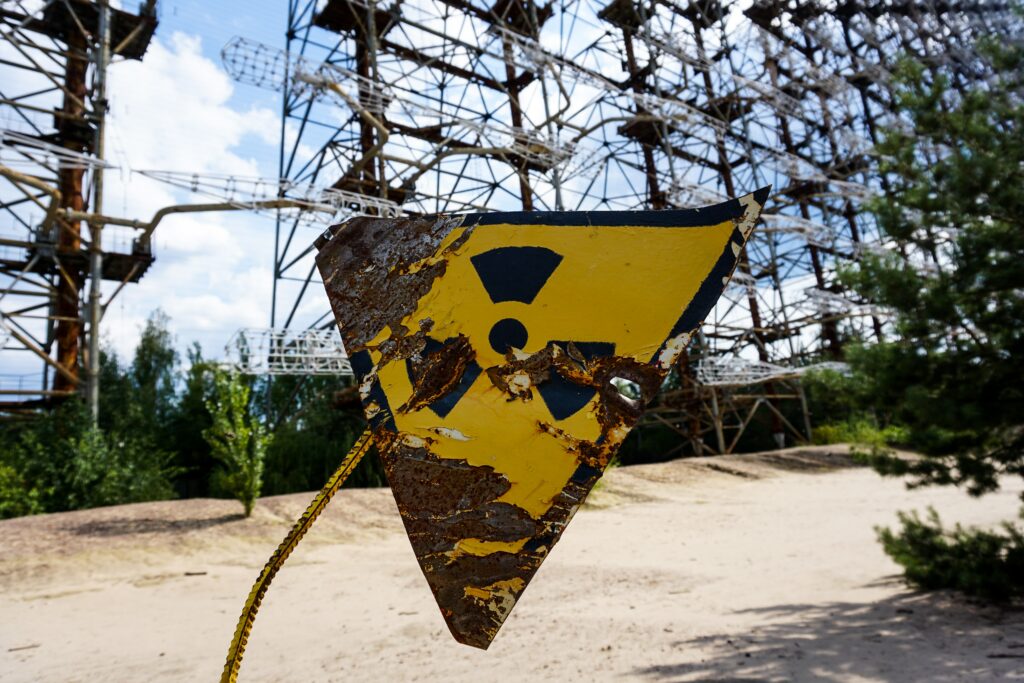Ukraine: the war fought on the energy front
Interview with Ukrainian energy expert Maryna Ilchuk
As the Russian offensive in Ukraine enters its 11th week, concerns over energy security and supply across the area continue to grow and the ensuing energy crisis shows no sign of receding.
The conflict has driven oil and gas prices to their highest levels in nearly a decade and forced many countries to reconsider their energy supplies. This is not an easy feat, considering that Russia is the world’s second-biggest supplier of natural gas (behind the US) and third-biggest supplier of oil (behind the US and Saudi Arabia).
Nonetheless, the European Union is now starting to grapple with its dependence on Russian natural gas imports and is making plans to break free from it completely as a response to the war.
While the rest of the world faces difficulties in coping with spiking prices and the geopolitical arm-wrestle, Ukraine is in the midst of a full-fledged attack not only on its territory but also on its energy system.
Lights on Women has sat down with Maryna Ilchuk, Counsel at CMS Cameron McKenna Nabarro Olswang, Ukraine, to get a first-hand account of the current situation of Ukraine’s energy sector and the reasons why Ukraine’s energy infrastructure might be one of Putin’s most priced targets in the war.
The damage to the infrastructure and the consequent economic loss is vast and systematic, says Ms Ilchuk, and part of a specific war tactic to put a strain on Ukraine’s resistance. She also testimonies that, in the face of Russia’s armed invasion, Ukraine’s energy system is still functioning, and the government is in a constant struggle to reconquer and reconstruct.
Read the full interview with Ukrainian energy policy expert Maryna Ilchuk below, in which we break down the damages inflicted to the Ukrainian energy sector as a whole, prospective for reconstruction and her commitment toward gender balance in the sector as a board member of the Women’s Energy Club of Ukraine.
With the conflict, the Ukrainian energy system came under attack. Nuclear safety concerns, power plants damaged by shelling, and spiking oil prices are some of the issues we are hearing and reading about. As an expert in the energy sector, can you give us some technical insight on the impact of the war on Ukraine’s energy system (electricity, gas) and economy?
As far as we can see, destroying energy infrastructure is one of the war tactics adopted by the Russian Federation. Since the start of the war, Russian troops have been constantly and deliberately shelling fuel storage plants, destroying electric power grids and gas pipelines, attacking power plants, etc.
They went as far as to seize Chernobyl (on 2 April Ukraine took control over Chernobyl NPP back and on 30 April NEC Ukrenergo restored a reliable power supply scheme for the Chernobyl Exclusion Zone) and Zaporizhzhia nuclear power plants (as of the beginning of April there were between 300 to 500 Russian soldiers and about 50 units of heavy equipment around the perimeter of the station.). As SC Energoatom reports, on Monday, 25 April, two cruise missiles were recorded over the Khmelnytskyi NPP. The moves raise fears of nuclear terrorism, targeting not only Ukraine but the entire European continent. According to the Ukrainian Ministry of Energy, the damage to the energy sector due to the Russian invasion is estimated at about two billion dollars, which includes not only the value of the assets themselves but also the loss coming from the electricity that could not be produced and sold.
Damage to electricity generating facilities. Much of the energy infrastructure was destroyed or damaged, including Okhtyrka’s cogeneration power plant (completely destroyed), while DTEK’s Luhansk thermal power plant was lost to Russia’s forces. According to the Minister of Energy as of the end of March electricity consumption fell by about 30% due to the war, and power generation by 40%. Gas production decreased by about 15%, in particular, Ukrgasvydobuvannya, the biggest state-owned Ukrainian gas production company, froze certain facilities in the Kharkiv region. Coal production in Ukraine decreased by about 30%. Ukraine has also lost control over nuclear fuel storage facilities (Ukraine took control back and on 16 April the power supply of the centralized spent nuclear fuel storage facility in the Chernobyl Exclusion Zone was restored).
Damage to renewable energy facilities. About half of renewable energy capacities are in the vicinity of active hostilities, as most solar and wind power plants are based in the southern regions. According to the Ukrainian Association of Renewable Energy, as of the end of March, Russia’s military invasion caused extensive financial damage to the renewable energy market, which was reportedly worth more than USD 5.6 billion in capital investment. More than USD 3.6 billion in capital investment is in the regions adjacent to the areas where active hostilities are taking place. In terms of generation capacity, more than 3,970 MW of renewables are in areas of imminent threat of complete or partial destruction, while an additional 2,400 MW are in areas adjacent to active hostilities with many stations already damaged or under an elevated risk of being destroyed.
Some of the Ukrainian renewable power stations have already been shut down due to equipment damage, while others have because of electric transmission lines’ destruction. There are registered cases of destruction of wind turbines, solar panels, electrical equipment of RES stations, electric transmission lines, and electrical substations. Russian occupation forces are also thought to have stolen various equipment from the stations.
Wind power plants. Due to the war, wind power companies operating in Ukraine have shut down two-thirds of their power plants. This was announced by the chair of the Ukrainian Wind Energy Association (UWEA) Andriy Konechenkov: “As of 9 March operation of wind power plants with a total capacity of 1,162.5 MW has been suspended. 372.5 MW remain in operation,” he said. According to UWEA, almost all wind farms have been shut down in the Kherson region.
The current situation with the gas transmission system infrastructure (GTS). According to the Ukrainian transmission system operator (GTSOU), the situation with gas supply remains unstable in the regions where ongoing hostilities occur.
Due to shelling in the Luhansk region, the regional gas distribution networks have been damaged. The GTSOU team and representatives of Luhanskgaz are preparing for the restoration of networks and gas supply to residents.
The TSO (Transmission System Operator) has reported numerous attempts by the Russian military and armed groups of the Luhansk People’s Republic to enter the premises of Novopskov compressor stations in Luhansk region, Kupyansk, Kharkiv region, as well as to interfere in the work of GTS facilities. The company emphasised that interference in the operational processes of the GTS poses significant risks to the safety of continuous gas transportation to consumers in Ukraine and Europe and could lead to a full supply disruption.
Gas distribution stations. As a result of hostilities, 47 gas distribution stations (GDSs) out of 1395 in Kharkiv, Luhansk, Kyiv, Donetsk, Zaporizhzhia, Kherson, and Mykolaiv regions of Ukraine remain temporarily shut down.
Underground storage infrastructure. On 5 March 2022 Ukrtransgaz (the operator of Ukraine’s underground gas storage) reported it had shut down one of its facilities in the eastern Ukrainian Luhansk region due to hostilities. A spokesperson from Ukrtransgaz reported: “The Krasnopopivske underground gas storage facility in the Luhansk region was shut down. The hostilities in the Luhansk region take place in dangerous proximity to the enterprise.”
The gas extraction at the facility had been suspended. Ukrtransgaz and GTSOU operators promptly changed their operating modes so that these damages would not adversely affect Ukraine’s gas supply.
On 14 March 2022 Ukrtransgaz informed that “shelling hit a building on the territory of the Olyshivka underground gas storage facility at about 9 a.m. during the bombing of the village of Olyshivka (Chernihiv region) by the Russian occupation forces. The pumping station that supplies methanol to the gas collection station was damaged.”

With the abrupt start of the war on their territory, many Ukrainians had to flee the stability of their home and cross the border. UNICEF reports that this is “in speed and scale the biggest refugee crisis we’ve seen since World War Two”. What can you tell us about the situation of the people who are staying? How are people coping with the heat and power outages that have been widely reported? Is the supply of energy to key public institutions (i.e. hospitals, government offices) stable?
With the war raging in our territory, many Ukrainian people remain without electricity, water and gas supply. As mentioned above this happens due to severe damage that the Russian military caused to our energy infrastructure. As of 30 March, more than 1,596 settlements in Ukraine remained without electricity, a total of more than 842,000 consumers, while 304,000 consumers were without gas, the Ministry of Energy reported.
As of 2 April, more than 1,260 settlements in Ukraine have remained without electricity, in total more than 850.2 thousand consumers.
As of 18 April, about 813 settlements in Ukraine have no electricity, in total about 675.8 thousand consumers. In particular, in the Donetsk region – more than 292,000 consumers, Kharkiv – 102,000, Luhansk – 108,000, Kyiv – 85,900 consumers. More than 258,000 consumers were without gas. The most difficult situation with gas supply is observed in Zaporizhia, Kyiv, Chernihiv, Sumy, Mykolaiv and Kharkiv regions.
According to the latest data from the humanitarian centre of Kyiv’s Regional State Administration, as of 30 April, the electricity supply has been fully or partially restored in 493 settlements for 272,800 consumers. 35 settlements and 22,947 consumers remain today without electricity supply. As of 2 May, provision of centralised water supply services has been fully or partially resumed in 120 settlements of the Kyiv region out of 123 in which this service was absent.
The workers of Ukraine’s utility companies in all regions are undertaking enormous efforts in order to restore the networks of settlements liberated from the Russian army.
As you may have already heard, many cities like Chernihiv and Mariupol are experiencing a humanitarian crisis, having had limited access to running water, electricity, or heat, since Russia escalated their assault on the cities.
Despite the fact that the Russian army continues to destroy infrastructure, including power grids, and gas pipelines, our workers of gas and electricity companies keep rebuilding them in order to return electricity and gas to the people of Ukraine. However, full-fledged renovation works can only start once the cities are liberated from Russian troops.
The workers of Ukraine's utility companies in all regions are undertaking enormous efforts in order to restore the networks of settlements liberated from the Russian army.
As you may have already heard, many cities like Chernihiv and Mariupol are experiencing a humanitarian crisis, having had limited access to running water, electricity, or heat, since Russia escalated its assault on the cities.
Despite the fact that the Russian army continues to destroy infrastructure, including power grids, and gas pipelines, our workers of gas and electricity companies keep rebuilding them in order to return electricity and gas to the people of Ukraine. However, full-fledged renovation works can only start once the cities are liberated from Russian troops.
The EU already imposed sanctions on Russia and helped Ukraine with the synchronisation of their electricity system with continental Europe – what else could the EU do in the short and longer-term to help the Ukrainian energy system?
The efforts that were made by the European Union and other EU energy stakeholders, including those by the TSOs of Continental Europe and ENTSO-E in order to speed up synchronisation of the Ukrainian power system, are of the utmost importance. Also noteworthy is that on 26 April 2022 Ukrainian TSO (Ukrenergo) joined ENTSO-E as an observer member, marking the beginning of a new chapter in the important relationship between Ukrenergo and all the European electricity TSO members of ENTSO-E.
We also appreciate the support of European countries in imposing sanctions on Russian companies and individuals. However, I believe that the next crucial step should be the imposition of even more severe sanctions, i.e., the full embargo on Russian gas, oil, and coal, a complete halt to the import of Russian energy resources, and export control of any supplies of tech components for the energy sector to Russia. We realise this may lead to a further increase in energy prices in all European countries, including Ukraine, however, this will provide a fundamental contribution to EU’s general effort to curtail revenues for the Russian state and its ability to finance the war. One shall admit that this is the price that we pay for our dependency on Russia, on one source of energy supply. At the same time security of supply is at the core of the EU’s energy policy and thus, this shall be prioritized by all countries. What is also important is to track the people and institutions who profit from the war and to put a stop to it. Ukrainian energy companies (DTEK Group, NJSC Naftogaz Ukraine and NPC Ukrenergo) have recently launched the “Stop Bloody Energy” initiative, a call to Western companies to stop all cooperation with Russia in the fuel and energy sector. Their website highlights the gas, coal, oil, field services and engineering companies that are helping fund Russia’s war and who are profiting from it. The only way to stop Russia is to deprive it of the funds it needs to continue this brutal attack.
You are part of the Women’s Energy Club in Ukraine. The mission of the club is to provide women working in energy-related sectors with a platform for professional empowerment and exchange. Tell us more about the work that you do, what is the mission of the club and your role in it?
The Women’s Energy Club of Ukraine (WEC) is an NGO and professional association of women working in energy-related fields in Ukraine with more than 150 members, among who are energy experts, representatives of Ukrainian and international organisations working in Ukraine on energy sector reforms, Members of the Committee on Energy and Utility Services of the Parliament of Ukraine, energy business and NGOs. The main goal of WECU is to bring together women professionals working in the energy sector for mutually beneficial cooperation to increase the number of women employed in the sector and thus reduce the gender gap in the industry.
During my experience as a Board Member for WECU and having been exposed to the work that women do in the sector, I have learned that women have an exciting potential to act as drivers of the green economy and the energy transition. Women professionals, both in Europe and Ukraine, are naturally inclined to work in fields related to energy innovation, including renewables, and are widely supportive of green energy solutions. For this reason, I believe they should be put at the forefront of the EU policy reform for the transition.
Finally, I would like to mention that, in the context of the war, WECU is working to identify women that had to flee their homes due to the military invasion and we are helping them to find different job placements in the cities they have settled in. I’d like to take this opportunity to call for energy companies with job openings in the energy sector to consider extending their offers to displaced Ukrainian energy experts and get in touch with us to lend a helping hand.
If you wish to get more information about WECU’s work and potential candidates for energy jobs, please get in touch with maryna.ilchuk@cms-cmno.com
____________________________________
 Maryna Ilchuk is a Counsel at CMS Cameron McKenna Nabarro Olswang Ukraine. She advises local and international clients operating in the fields of energy, oil and gas on infrastructure, regulation, state aid and environmental law. She has worked in the energy sector as a consultant for more than 10 years, on numerous complex energy and infrastructure projects, oil & gas, as well as renewable-related projects.
Maryna Ilchuk is a Counsel at CMS Cameron McKenna Nabarro Olswang Ukraine. She advises local and international clients operating in the fields of energy, oil and gas on infrastructure, regulation, state aid and environmental law. She has worked in the energy sector as a consultant for more than 10 years, on numerous complex energy and infrastructure projects, oil & gas, as well as renewable-related projects.
With a long-standing focus on the energy industry, she has advised on legislative initiatives in Ukraine’s energy market (electricity and gas market, renewables auction system, energy efficiency, biomethane, energy storage, etc.). She has also been an active member of industry associations, being at certain periods of time Board Member of the European-Ukrainian Energy Agency (EUEA), an officer of the oil and gas committee of the International Bar Association (IBA), and a member of the Ukrainian Bioenergy and Wind Associations. She is also a Board Member of the Women’s Energy Club of Ukraine (WECU).






